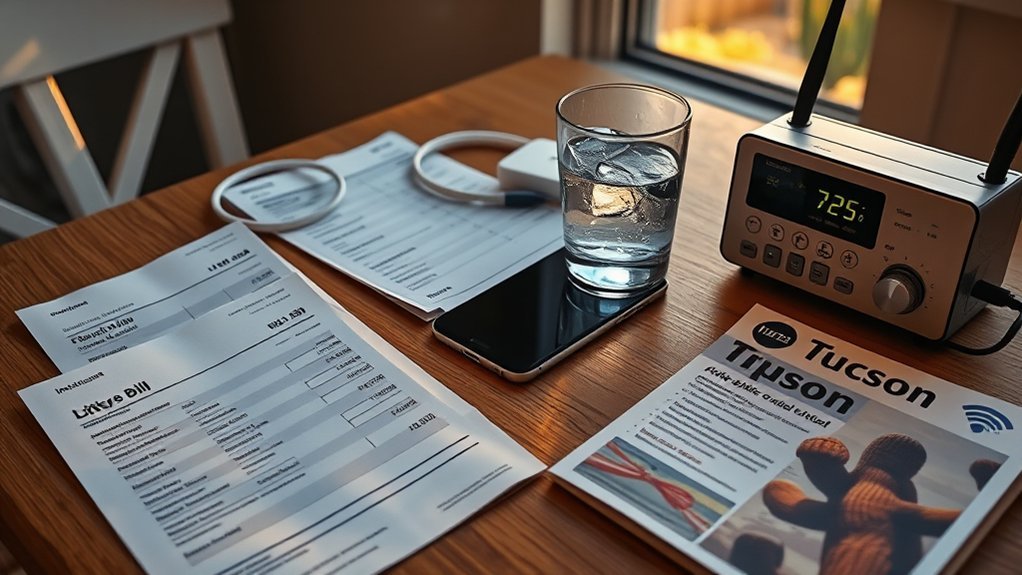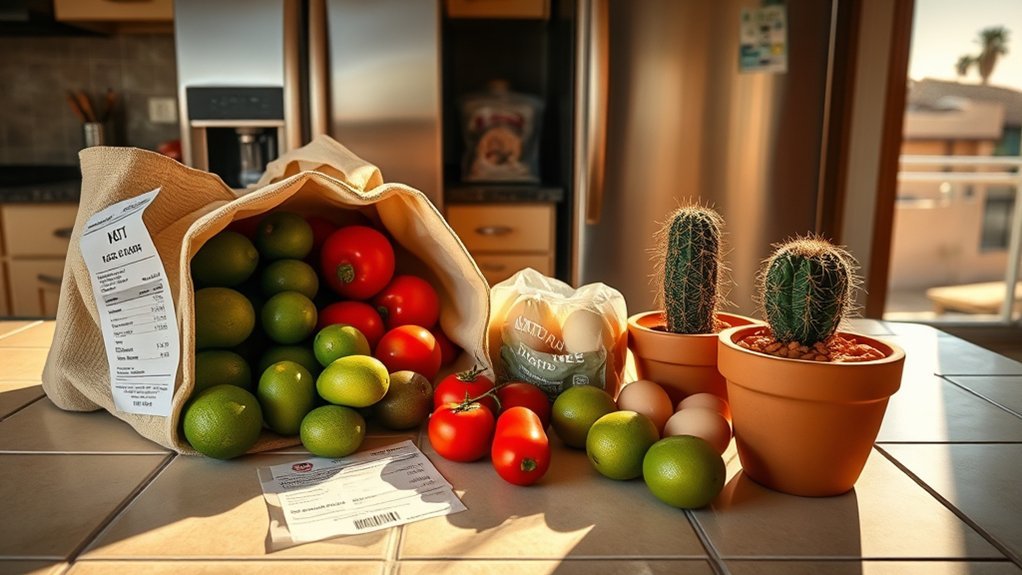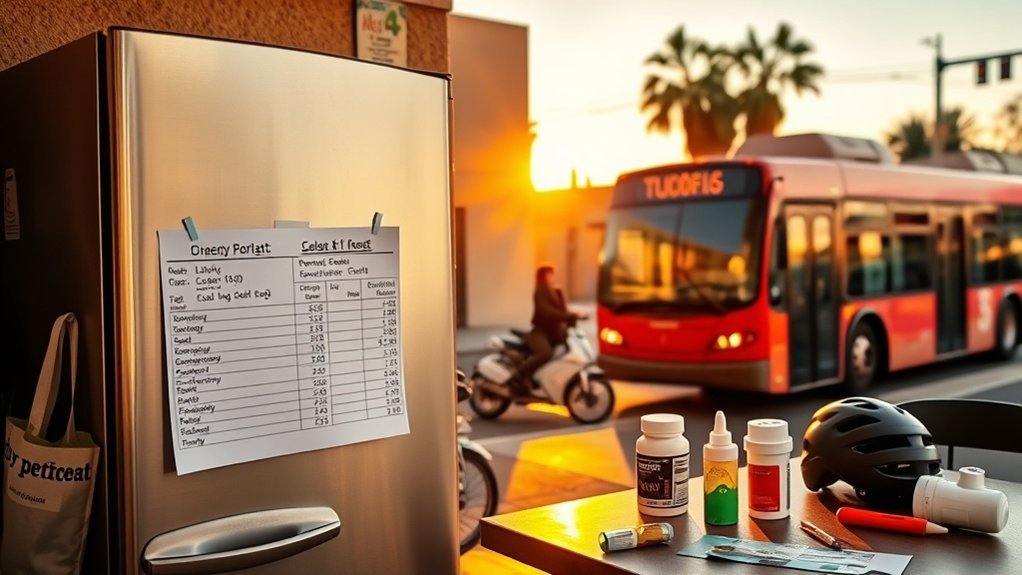If you’re planning life in Tucson, you’ll want a clear, numbers-first view of monthly costs so you can plan pay, rent, and essentials with confidence. Housing is the biggest driver, with typical rents clustering from about $988 to $1,650 and higher-demand areas topping $2,500, while utilities, groceries, transport, and services add several hundred dollars more each month. Keep going to see how those pieces add up and what pre-tax salary typically covers them.
Cost of Living Snapshot for Tucson, AZ

Compared with the U.S. average, living in Tucson will cost you slightly more — about 3.3% higher overall — which translates to a recommended pre-tax single-adult salary near $59,088 per year.
Living in Tucson runs about 3.3% above the U.S. average — roughly a $59,088 pre-tax single salary.
You’ll want to budget monthly essentials around $4,924 if you’re renting: groceries, housing, utilities, transportation, and goods & services make up that total.
Expect groceries and many services to run above national norms (groceries ~5–6% higher; goods & services ~8.5–12% higher), while healthcare will save you money at roughly 7–10% below the U.S. average.
Utilities and communications average about $199.11 for energy plus $193.13 for phone, and gasoline sits near $4.47/gal, pushing transportation slightly above typical costs.
Rent varies by source — commonly $1,000–$1,650 monthly — so your housing choice will strongly affect your budget. Additionally, building a house can often be more expensive than buying an existing home, making it vital to consider your options when planning your finances.
Use these figures to plan a realistic monthly spending target and adjust for lifestyle or household size in Tucson.
Housing: Renting vs. Buying in Tucson

Now that you have a snapshot of Tucson’s overall living costs, the biggest budget decision is whether to rent or buy—because housing will drive most of your monthly spending.
You’ll see the average rent in Tucson reported between about $1,000 and $1,650/month (sources: RentCafe $1,254; Redfin $1,042; Zillow ~$1,600), with a citywide figure near $988 that’s roughly 40% below the U.S. average.
Use those ranges to benchmark rental options: many neighborhoods cluster $1,000–$1,800, while higher-demand pockets exceed $2,500–$4,400.
Compare typical monthly renter housing cost (~$2,064) to homeowner housing cost (~$2,250) when estimating total monthly obligations.
Expect modest rent growth (Zumper median $1,394, up ~3% YoY) driven by migration and investment activity.
If you value flexibility or lower up-front cash, renting usually wins; if you plan to stay long-term and can cover down payment, taxes and maintenance, buying can amortize costs. Consider also the initial startup costs associated with group homes if you’re thinking about investing in real estate for rental purposes.
Factor neighborhood, volatility, and your time horizon into the decision.
Monthly Utilities and Telecom Expenses

Although Tucson’s milder winters cut heating costs, its hot summers push average monthly energy bills to about $199.11. You’ll find utilities meaningfully affect your budget: renter households average roughly $390/month for energy, water, trash, and telecom, while homeowners average about $874/month due to larger energy use and extra services. Utilities put Tucson around 3.3–4.0% above the U.S. average.
| Item | Typical Monthly Cost |
|---|---|
| Energy (avg) | $199.11 |
| Phone/Telecom | $193.13 |
| Total renter utilities | $390 |
When comparing apartments, factor these utility figures into your monthly rent in Tucson to avoid sticker shock. Telecom costs sit ~1% above national levels, and combined utility categories run about 1.9–3.8% higher than U.S. averages. Plan for seasonal spikes in cooling demand and consider energy-efficient choices to lower bills.
Grocery and Everyday Food Prices

Expect to pay slightly more than the national average for basics: a gallon of milk is about $4.74, a dozen eggs $5.40, bread $4.38, and bananas $0.80 each.
With meat and pantry staples higher too — steak ~$15.47, ground beef ~$6.71/lb, coffee ~$6.33, cooking oil ~$8.39 — a typical renter spends roughly $737/month on groceries while homeowners average about $1,465.
Use those figures to plan a weekly meal budget (roughly $170–$366/week depending on household size and preferences). Additionally, having a reliable portable jump starter can save you from unexpected expenses related to vehicle breakdowns.
Typical Grocery Item Costs
Compare grocery prices in Tucson with a quick glance at common staples: a gallon of milk runs about $4.74, a dozen eggs around $5.40, and a loaf of bread about $4.38, while meat tends to be pricier (steak roughly $15.47/lb, ground beef $6.71/lb).
You’ll notice groceries run about 5–6% above the U.S. average, with eggs showing a sharp ~58% increase. Produce and pantry items also matter: potatoes $4.69, lettuce $2.01, bananas $0.80 each, coffee $6.33, cooking oil $8.39.
Use these facts to plan shopping and compare stores.
- Prioritize staples that keep per-unit cost low.
- Track meat and egg prices; they drive totals.
- Buy seasonal produce to reduce cost.
This snapshot helps you budget groceries efficiently.
Weekly Meal Budget
When you plan weekly meals in Tucson, budget about $170 per week for a single renter based on a $737 monthly grocery estimate, and scale up from there for couples or families (for example, roughly $330/week for a married couple with young kids).
Use common local prices to set menus: a gallon of milk at $4.74, a dozen eggs $5.40, a loaf of bread $4.38, and bananas $0.80/lb.
If you buy more protein and packaged goods, expect higher spend—steak $15.47/lb, ground beef $6.71/lb, coffee $6.33, cooking oil $8.39.
Groceries run about 5–6% above the U.S. average, so add a modest premium when comparing national weekly budgets.
Healthcare and Transportation Costs

You’ll want to compare specific healthcare prices—typical doctor visits run about $126.25, dentist $101.98 and optometrist $116.49—since overall healthcare costs are roughly 6.9–9.9% below the U.S. average and OTC meds like ibuprofen average $11.12.
On transportation, fuel is a key driver at about $4.47 per gallon (≈9% above national), with maintenance items (e.g., tire balance $52.91) contributing to transportation costs that are 3.5–8.4% higher than average. It’s also advisable to be aware of preventive measures to help reduce future transportation expenses related to vehicle upkeep.
For monthly budgeting, plan roughly $403 for renters and $849 for homeowners to cover typical travel and vehicle expenses alongside your expected medical visits.
Healthcare Price Breakdown
Although Tucson’s healthcare services tend to be cheaper than in many U.S. cities, you’ll still want to factor in both medical and transportation-related costs when budgeting.
Overall healthcare expenses are lower than the national average — about 6.9–9.9% below the U.S. norm — so routine care will cost less.
Typical visit prices: doctor $126.25, dentist $101.98, optometrist $116.49. OTC ibuprofen runs about $11.12.
- Plan for visit fees and modest prescription or OTC costs.
- Include occasional auto-related healthcare travel costs (gas about $4.47/gal, tire balancing ~$52.91).
- Expect healthcare to be a smaller share of household spending compared with many cities.
Use these figures to set a realistic monthly health budget that reflects Tucson’s affordability.
Transportation Cost Drivers
After accounting for lower-than-average medical costs, it’s important to look at how healthcare-related travel and everyday commuting boost overall transportation spending in Tucson.
You’ll pay about $4.47 per gallon for gas — roughly 9% above the U.S. average — which pushes monthly transport outlays higher.
Renters typically see about $403/month in transport expenses; homeowners average roughly $849/month, reflecting more vehicle ownership and longer commutes.
Tucson’s overall transport costs run about 3.5–8.4% above national averages, driven by fuel and service prices.
Routine maintenance adds up: a tire balancing costs about $52.91 and similar services recur.
Public and private transport spending are included in household category totals, so factor both when you plan monthly budgets.
Budgeting for Care & Travel
Factor in both medical out‑of‑pocket costs and higher local fuel and maintenance when you build a monthly care-and-travel budget for Tucson. You’ll face doctor copays around $126.25, dental visits near $101.98, routine optometry about $116.49, and cheaper overall healthcare (6.9–9.9% below U.S. average). Add prescriptions and OTCs (ibuprofen ≈ $11.12).
- Plan gas at roughly $4.47/gal, about 9% above the national average.
- Include routine maintenance (tire balancing ≈ $52.91) and higher transportation category costs (3.5–8.4% above norms).
- Use the provided transportation benchmarks: renters ≈ $403/month, homeowners ≈ $849/month.
Compare these figures to your rent and adjust discretionary spending so medical and commute needs don’t erode savings.
Goods, Services, and Entertainment Expenses

When you budget for everyday life in Tucson, plan on paying noticeably more for goods and services than the U.S. average — overall costs run roughly 8.5–12.1% higher, with common services like haircuts around $29.77 (about 24% above typical U.S. prices) and dry cleaning averaging $20.17 per item (≈25% higher).
Living in Tucson means factoring higher personal care and household service costs into your monthly plan: beauty salon visits average $45.60 and veterinary care runs about 42% above the national norm, so pet and grooming budgets should be increased accordingly.
For entertainment, expect a movie ticket near $12.53 and drop-in yoga around $13.81 per class; occasional outings will add up faster than in lower-cost markets.
Clothing and retail basics follow the premium pattern — men’s shirts ~$41.30 and women’s slacks ~$35.99. Understanding the average fees for services can help you make informed financial decisions.
Use these specific price points to create realistic line items in your budget and prioritize which services you’ll pay for versus cut back on.
Recommended Salary by Household Type

Although Tucson’s overall cost of living is only about 3.3% above the U.S. average, you’d need roughly $59,088 a year before taxes to cover a single adult’s basic expenses under the report’s guidelines. That recommended salary by household type is driven largely by housing: the report lists average annual housing for a single adult at about $24,768. Compare that to the city’s median household income of $54,546, and you can see many households fall short of the recommended salary for one person.
Consider these quick comparisons to plan your budget:
- Renters: about $4,924/month in basic expenses, implying a higher required take-home relative to wages.
- Homeowners: roughly $8,774/month, showing ownership raises monthly needs substantially.
- Single-adult housing share: $24,768/year, a major portion of the $59,088 recommended salary.
Additionally, understanding essential fees explained can help in budgeting for various living expenses. Use these figures to adjust expectations and target income based on your household type.
Frequently Asked Questions
What Is the Cost of Living in Tucson, Arizona per Month?
You’ll need roughly $4,900/month as a renter (about $2,064 housing), though rent varies $988–$1,650; homeowner costs run higher near $8,700/month. Don’t forget Seasonal Expenses like energy spikes and cooling bills.
How Much Money Do You Need to Live Comfortably in Tucson?
You’ll need about $59,088 annually (roughly $4,924/month) to live comfortably in Tucson; this covers rent, groceries, utilities, transport, and lets you enjoy Outdoor Activities without stretching your budget.
How Much Does Independent Living Cost in Tucson?
You’ll need about $4,900/month (roughly $59k/year) for independent living in Tucson; housing dominates, groceries/utilities add up, transportation varies, and desert gardening can lower food costs while fitting local climate and budget.
Is Rent Expensive in Tucson?
Think of Tucson rent as a steady breeze — it’s generally affordable compared to major cities. You’ll find Housing Affordability stronger here, though prices vary by neighborhood and have risen recently, so check local rent data.
Conclusion
Think of Tucson’s budget like tending a desert garden: you’ll water housing first, since rent shapes the whole plot, then sprinkle utilities, groceries, transport, and healthcare where needed. With monthly essentials near $4,924 and a recommended pre‑tax pay around $59,088, plan allocations based on those anchors. Use cost clusters ($1,000–$1,800 rent typical) to guide choices, prioritize savings for summer energy spikes, and cultivate a resilient financial landscape that survives lean months.



1 thought on “Average Living Cost in Tucson: Monthly Budget, Rent & Essentials”
Pingback: Average Living Cost In Dubai: Prices, Rent & Salary Guide